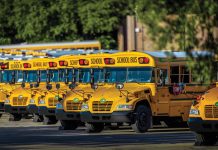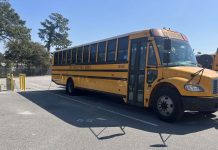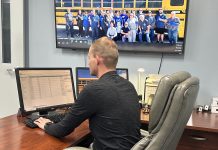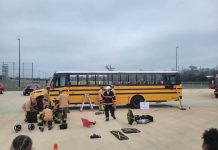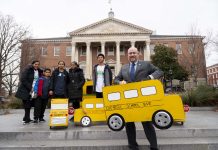SACRAMENTO, Calif. – The leaders of California’s population centers issued a call to the incoming Congress to update the nation’s transportation program to address their citizens’ 21st-century needs, from upkeep of roads and bridges to a cleaner, more efficient transit network.
As a new Congress prepares to take up a multi-year infrastructure bill, 65 California mayors, supervisors and other elected officials joined together to send a united message about what their communities need for economic recovery and quality of life.
The elected officials released a signed letter sent to Senator Boxer with national coalition Transportation for America expressing their support for reforms to the federal transportation program that would help California make the transportation investments needed to bring down California’s 12 percent unemployment rate, clean the air, and lay the foundation for healthier, more livable communities.
“The nation’s transportation program has not been significantly updated since the creation of the Interstate Highway System in the 1950s. With California and the nation facing new and different challenges in the 21st century, a modern approach is needed to ensure that transportation continues to fuel the economy of California and the nation,“ said Mayor Gavin Newsom of San Francisco, who will soon take statewide office as Lieutenant Governor. “We need to put people back to work connecting our cities with high-speed rail, efficient and affordable public transportation systems, and building clean freight systems and safe places to walk and bicycle.”
According to a study from the nonpartisan Economic Policy Institute comparing an equivalent amount of investment in the current federal transportation law with a proposal containing reforms from Transportation for America, California is poised to see 807,000 new jobs by focusing on accountability and performance while building a 21st century transportation system.
With five of the ten cities with the worst air pollution in the country, it’s critical for California to clean its air and improve public health — areas where transportation has a major, but often ignored, impact. In the greater Los Angeles region alone the health costs of air pollution are conservatively estimated at $22 billion per year, dragging down the economy and quality of life. The region is home to more than 12 million vehicles as well as the two busiest ports in the United States, the Ports of Los Angeles and Long Beach.
As a member of the California Air Resources Board, the state agency responsible for cleaning California’s air, Riverside Mayor Ron Loveridge believes that providing safe, clean, and efficient transportation alternatives are a crucial step toward relieving congestion, reducing air pollution and ensuring people and goods move freely and efficiently.
“There is a great need for sustained high-speed rail funding and the creation of a national freight plan to fund clean air projects. As the trade gateway to the United States, Southern California needs to have a long-term vision to clean the air while improving economic competitiveness. The federal bill should have dedicated revenues to support sustained investments in regional high-speed and clean freight rail that connect and serve our cities and trade hubs,” Mayor Loveridge said.
Compared to cars, passenger rail reduces oil consumption by 40 percent. Freight rail is four times more energy efficient than trucks and one train can carry as much cargo as 200 trucks. With thorough planning and placement, rail investments — including high-speed passenger rail — can reduce traffic on congested highways.
San Francisco, Sacramento, San Diego, Los Angeles and other major metropolitan cities will continue to grow. Safe, affordable and efficient public transportation systems will become increasingly important in connecting people to the jobs and services they and their families depend on. A bipartisan, national Transportation for America poll found that over 80% of Americans believe the nation would benefit from an expanded and improved public transportation system.
“Federal funding will allow our public transportation systems to continue to grow and serve expanding communities,” said San Diego City Councilmember Todd Gloria. “Investments in both capital transit projects and ongoing transit operations demonstrate the prioritization of strong alternatives to single-car transportation.”
Voters are also increasingly willing to tax themselves for improved transportation when they know clearly what they’re getting for the money — like voters did in Los Angeles with Measure R, a half-cent sales tax approved by a two-thirds majority to rapidly expand the local transit system. Elected leaders in the Los Angeles region such as Mayor Richard Bloom of Santa Monica are pushing for innovative financing programs from the federal government that would make ambitious programs like the 30/10 initiative — a plan to build 12 major transit projects in 10 years rather than 30 — a reality.
These programs will create thousands of jobs and reduce air pollution and oil dependency, thus addressing the most serious national and global challenges we now confront as Americans,” said Mayor Bloom and Councilmember Terry O’Day. “What is truly exciting is that they will do this while improving the quality of life in our neighborhoods and give people access to services they need without having to drive to get them.”
These leaders also called for more accountable and transparent spending to ensure that during the recession and beyond, every federal dollar for transportation gets the most bang for the buck. The letter to Senator Boxer details the group’s collective support for a process of setting long-term goals for states and regions to pursue. Using these goals, regions and states would create regional plans and prioritize investing in projects to make continuous progress towards meeting them. Goals would include achieving measurable progress in increasing transit ridership, reducing congestion, repairing roads, making communities more walkable and bikable, reductions in air pollution, and improving safety, to name a few.
“Performance-based planning programs like the Sacramento Regional Blueprint provide a model for supporting economic growth, a cleaner environment, and safer and more effective transportation options through smart planning with specific goals in mind” said Mayor Kevin Johnson of Sacramento. “In these times of limited resources, we must embrace accountability measures to make sure that each and every tax dollar is spent wisely,” Our federal transportation program must keep the eyes on the prize – and support regions in focusing spending on projects that will deliver the outcomes our communities need.”
“Transportation For America’s platform promotes a transportation policy that will serve both local needs and national priorities,” said Judy Corbett, Executive Director of the Local Government Commission, a longstanding Transportation For America partner based in Sacramento. “I’m thrilled that so many California elected officials are joining us in speaking out on the critical issue of investing in a 21st century transportation system.”
The federal transportation bill is rewritten only every six years. These 65 elected leaders are making it clear to Congress that they must adopt reforms that will prioritize maintaining our existing infrastructure and funding the 21st century transportation system that is safer, cleaner, smarter, and works for all communities.
Transportation for America (T4 America) is the largest, most diverse coalition working on transportation reform today. Our nation’s transportation network is based on a policy that has not been significantly updated since the 1950’s. We believe it is time for a bold new vision — transportation that guarantees our freedom to move however we choose and leads to a stronger economy, greater energy security, cleaner environment and healthier America for all of us. We’re calling for more responsible investment of our federal tax dollars to create a safer, cleaner, smarter transportation system that works for everyone.



